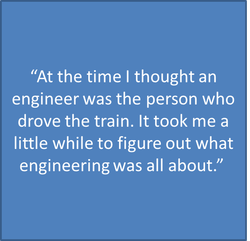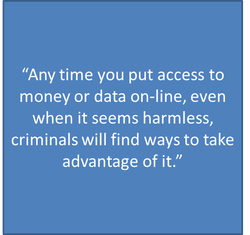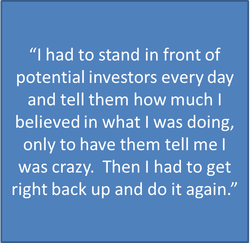
On her unconventional path to a career in computer engineering:

Laura: When I first applied to college, I wanted to study journalism. It was my Dad who said, “Wait a minute; what you really love is physics and math. Don’t you think you should go into engineering?” To be honest, at the time I thought an engineer was the person who drove the train. It took me a little while to figure out what engineering was all about. Then, when I went to Preview Day at the University of Colorado, I visited both the journalism school and the math department. The math department was simply more fun and that’s how I ended up there. Having a math background turned out to be fortuitous, because my career involves a lot of vector analysis, which is math-based.
Jill: What was responsible for your transition from math to computer science for your graduate studies? While they are highly related fields, it’s not necessarily the transition that everyone makes.
Laura: After finishing my undergraduate degree, I applied to a number of graduate schools in applied math. At the time, the kind of research that was getting government funding was called “partial differential equations (PDEs),” which happened to be my least favorite subject. Every time I went to a grad school campus to interview, people would ask me if I was excited about PDEs, and I knew then that I didn’t want to spend the next four to seven years doing PDEs. On a bit of a whim, I had also applied to the University of Colorado Computer Science Graduate School Program, was accepted, and decided to pursue computer science. It was sort of a fluke just based on my not liking a certain subject, but I’m so thankful now that’s where I ended up. In some ways, I feel like I’ve stumbled into certain experiences and I was able to harness the advantages of combining different kinds of training and practices.
On working in the public sector, and life at the NSA:
Laura: At the time, the NSA was looking to recruit more women. I received a fellowship through the National Physics and Science Consortium sponsored by the Agency, a program set up for women and minorities in math and science. It was an incredible fellowship, and actually paid for my grad school. I also did two summer internships at the NSA. After I graduated, my first job was with the NSA’s Applied Math Program. That three-year program brought in a bunch of Ph.D.s like me to spend six months in six different organizations to learn the basics of the Agency.
Jill: You mentioned that the NSA was actively working to recruit more women. Were women relatively uncommon at the Agency while you were there?
Laura: It’s a very male-dominated organization; of the 30 or so participants, four were women. Also, we frequently collaborated with the US military, which tends to not be the most female-friendly culture.
Jill: As someone who has worked for both private Internet security companies and a government security agency, do you think that for-profit companies can combat fraud better than the government?
Laura: I definitely think it should be a partnership. The government has certain resources and access that different private entities on their own don’t have. Meanwhile, private entities have innovation and agility that the government doesn’t have. So together it’s the ideal marriage. Still, I don’t know how to make that partnership happen. From my experience at the NSA, I know it was a huge bureaucracy, and very much an old boys’ network, so it can be a challenge for private companies, particularly smaller private companies, to work with them, although I understand that is changing. While 9/11 was a terrible tragedy for our country, it also served as an eye-opener for a lot of people in security. I hear that the government is hiring better people, and that they are trying to be more innovative and more accepting of newer technology. I’m just waiting to see the results of that.
On transitioning from the public to the private sector, and seeing an opportunity to start her own company:

Laura: With the sophisticated web sites and mobile applications that are being launched, a lot of vulnerabilities are being opened up to criminals.
For example, if I run an e-commerce site and I want to attract more customers, I might offer an incentive so that if a customer signs up and then refers up to 5 friends, I’ll give that customer $5 per friend. That sounds pretty harmless, right? But I’ve seen many cases where cybercriminals take advantage of situations like that; they just keep creating accounts and signing up friends and suddenly they’ve made $50,000. Any time you put access to money or data on-line, even when it seems harmless, criminals will find ways to take advantage of it.
In some ways, cybercriminals are able to be more agile than security firms, who need to run quality assurance testing on all of their programs. Cybercriminals don’t need to deal with QA, project planning, releases and meetings. When cybercriminals find new ways to steal money, it takes large corporations a long time to figure out what the heck the criminals are doing. Then it takes an even longer time, sometimes weeks or months, before a fix can be rolled out.
Jill: When did you decide to start your own company?
Laura: After eBay, I worked for a year and a half at Mark Monitor. That break essentially gave me the time I needed to step back from eBay and look strategically at solving Internet fraud. I saw so clearly the need for security tools that would be better able to identify attacks quickly and also enable site owners to make changes within minutes, without having to marshal a lot of development resources. I realized, holy cow, if I had just these couple of tools, I could have been so much better. And that’s how the idea of Silver Tail started.
On the start-up process, and the challenge of convincing others — as well as herself — that her company could succeed.

Laura: I think a better question is, What wasn’t I afraid of? I can’t think of anything I wasn’t afraid of. It was very scary financially, because we went without salaries for nine months. It was also scary professionally. To be honest, I had what I called my “professional judgement paranoia;” I worried that if I tried to start a company dedicated to selling a product or service, people would see me as less of a technology professional. However, I also I feared that I didn’t know what the heck I was talking about technically.
Jill– What do you mean by that? Wasn’t technology your whole background?
Laura: Yes it was, but I had only done it at eBay. Maybe out there in the world there was already something that did exactly what our newly developed tools did, but better. I didn’t know.
Raising money was tough, because it felt like venture capital investors validated all of those fears. They tell you that you don’t know what you’re talking about, you don’t understand your market, you’re not going to be able to sell this thing, and you’re not going to be able to recruit the team you want. They just say that because they need you to prove whether or not you can. That was probably the toughest nine months of my life. I had to stand in front of potential investors every day and tell them how much I believed in what I was doing, only to have them tell me I was crazy. Then I had to get right back up and do it again.
Jill: Are you saying that you had to convince them that you so strongly believed in this company when you actually had your own doubts as well?
Laura: I did. It’s funny because my co-founder, who is now my husband by the way, said all along that the world needed our product, and that we were moving forward. I would say, okay if you say so. I had moments of doubt. I had never created a start-up, and didn’t know how to start a business or sell a product. I had a ton of insecurities. I just had to put on a good face, act like I knew what I was talking about, and hope that I’d figure it out along the way.
Jill: Did your co-founder put on a good face for your sake, or did he really believe you had something?
Laura: No, he really believed it.
Jill: Do you think you would have been able do this without a partner or without that particular partner?
Laura: No way. There’s a zero percent chance that I could have. I’ve been a professional for 15 years or so now, and I definitely feel that the stereotype of women having more insecurities than men rings true for a lot of my women friends. We all seem to have this professional insecurity that I don’t see with men. Even when I talk with men, heart to heart, I don’t sense that they share those professional self-doubts that so many women have.
Jill: How did you overcome your fears? You clearly did a great job; you got funding, you got a team, and you have a great company now.
Laura: To move forward, I recalled other times in my life that initially seemed scary to me. For example, I thought back to when I was a freshman undergrad and my adviser signed me up for a graduate student lab, telling me that he wanted to see how a freshman would do in that lab. I felt so unprepared and scared at the time. Yet, I took the class and it turned out very well! I got to know some grad students who mentored me and they even helped me find fellowships. When I doubt myself, I just think back to examples like that, where I felt scared and it turned out great. You have to understand that it’s just a fear, and it doesn’t matter.
Another realization came to me while I was raising money. I felt that people would think I was a failure professionally if the company didn’t make it. Then, one day I realized that I didn’t care what they think. I’m going to get up every day and do the best darn job I can do, and I’m going to be proud of what I do every day. I decided that was really all that matters. It was a very liberating discovery.
Jill: Now that you have a company that is quite successful and will become more successful as time goes on, would you do it again?
Laura: It’s so much work in the beginning. It takes every ounce of your being. Let me just say that I’d love to be involved in the very early stages of a company for sure, but being the one or two people who put everything on the line and go without a paycheck for nine months is not easy. It was very hard to go talk to potential investors and have them tell me my idea had no value. But I don't have that fear anymore. So, that is no longer a concern. But anyone starting a company from the ground up also has her personal, life circumstances to think about as well.
 RSS Feed
RSS Feed
